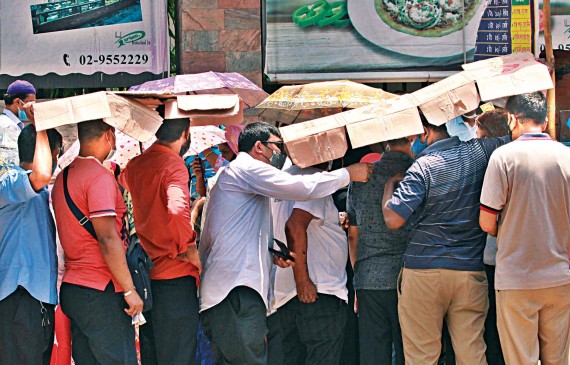
Lockdown Fallout: City poor barely on govt’s mind

Over the last couple of weeks, Abdus Sobhan, a day labourer in the capital, saw his earnings drop to almost nothing.
With the government-imposed restrictions taking effect on April 14, the 40-year-old man, who crushes bricks and moves soil at construction sites, could hardly manage any work to make a living.
For all latest news, follow The Daily Star's Google News channel.
With very little income and no help around, he is worried about his survival in the city in the coming days as the government extended the restrictions till May 5.
"I have my elderly parents at my village home to look after. But if I cannot earn, how would I feed my family? Sobhan, who has been living in a slum in the city's Mirpur area for nearly seven years, told this newspaper yesterday.
"Before the lockdown, I used to earn Tk 600-800 a day. But I could earn only Tk 300 in the last four days. I heard the government is giving food aid, but I haven't yet got any. How will people like us survive in the capital without any work or government assistance?" asked the helpless man.
Like him, thousands of poor people in urban areas, who couldn't find any work or source of income during the lockdown, remain deprived of the benefits of the government's social safety net schemes.
Many of these economically vulnerable people in urban areas with little or no savings to fall back upon had no choice but to leave for village homes during the lockdown imposed to curb the rapid spread of Covid-19.
Rural areas have always been the focus of safety net programmes. Though the government has made considerable progress in expanding the social safety net over the years, the country's urban poor have negligible access to the benefits.
A government survey in December last year revealed that the social safety net schemes fail to cover millions of urban people facing food insecurity.
The open market sale (OMS), a subsidised food distribution programme, for example, covers only 1 percent of the poor urban households while 2 percent urban poor are supported by old-age allowance, said the survey conducted by Bangladesh Bureau of Statistics (BBS).
"Despite the government's commitment to uplifting the poor, there is a lack of social safety net programmes for urban poor. Available information suggests that millions of food insecure urban people still remain uncovered," said the survey titled "Urban Socioeconomic Assessment Survey (USAS) 2019".
The BBS surveyed 2,150 households in city corporation areas across the country from December 8 to 26 last year. But the study, the first of its kind, did not reflect the impact of the Covid pandemic.
There are around 81 lakh beneficiaries under the programmes which include OMS, income security for the elderly, widows, and persons with disabilities, and pension schemes for retired government employees and their families.
According to an estimate of the BIDS, the countrywide shutdown caused 80 percent drop in income of the people belonging to the labouring class in urban areas and 10 percent drop in income of the same segment of population in rural areas.
Bangladesh Institute of Development Studies (BIDS) prepared the report titled "Poverty in the time of Corona: Trends, Drivers, Vulnerability and Policy Responses in Bangladesh" in June last year to assess the fallout of the Covid-induced shutdown.
NO GOOD NEWS FOR URBAN POOR
With the ongoing restrictions extended till May 5, there is no good news for the urban poor this time as the government decided not to sell rice at a subsidised rate (Tk 10 a kg) through its OMS outlets.
Food ministry officials said the government made such a decision because of the dwindling food stock.
Food Secretary Mosammat Nazmanara Khanum said the government is continuing open market sale of coarse varieties of rice for Tk 30 a kg from 874 trucks across the country.
"We have informed the finance ministry that we will not be able to sell rice at Tk 10 per kg through OMS because of the dwindling food stock. The government has to give cash incentives instead of rice," she told The Daily Star.
The government's food reserve dwindled to 4.62 lakh tonnes on April 20. In July last year, it had a rice stock of 11.20 lakh tonnes, which was 15.99 lakh tonnes on July 1, 2019.
The food secretary further said the government had sold 86,000 tonnes of rice at Tk 10 per kg through the OMS in city corporation areas all over the country from April to June last year.
Last year's BBS survey found that the existing safety net portfolio has grown in an unplanned manner with duplication resulting from incorrect targeting, leakage and a lack of coordi
Editor & Publisher: S. M. Mesbah Uddin
Published by the Editor from House-45,
Road-3, Section-12, Pallabi, Mirpur
Dhaka-1216, Bangladesh
Call: +01713180024 & 0167 538 3357
News & Commercial Office :
Phone: 096 9612 7234 & 096 1175 5298
e-mail: financialpostbd@gmail.com
HAC & Marketing (Advertisement)
Call: 01616 521 297
e-mail: tdfpad@gmail.com